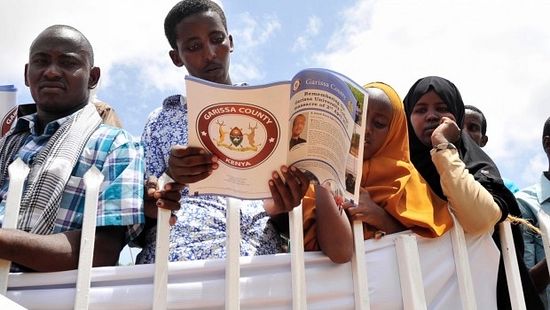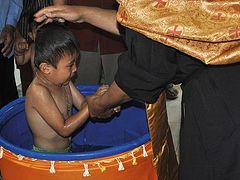Source: Orthodox Christian Network
April 4, 2016
 Photo Source: ABC News, The Associated Press; Photo: Kenyans take part in the memorial ceremony at Garissa University, Garissa, Kenya, Saturday, April 2, 2016.
Photo Source: ABC News, The Associated Press; Photo: Kenyans take part in the memorial ceremony at Garissa University, Garissa, Kenya, Saturday, April 2, 2016.
Today, International Christian Concern (ICC) marks the anniversary of the deadly al-Shabaab terror attack on Garissa University in northeastern Kenya, which killed 148 people, mostly Christians.
The bloody assault that left 143 students and five security officers dead represents Kenya’s worst persecution attack to date. It also ranks among the deadliest terror attacks on Kenyan soil after the 1998 bombing of the US Embassy in Nairobi, which killed 213 people.
Remembering Garissa
On April 2, 2015, around five a.m., five gunmen from the Somali Islamist terror group breached the gates at Garissa University. They stormed the campus, murdering university security guards and executing two others on the spot.
Garissa University Principal Ahmed Warfa remembers one of the saddest days of his life.
“I called the Garissa town police commandant and he advised me to stay inside my house as the Administration Police and Kenya Defense Forces (KDF) made their way to the University. The gunshots could be heard towards the classrooms and that’s when I knew the school was under siege,” he told ICC when we visited the campus in January.
Warfa’s house was located next to the gate and he was the first person to hear the gunshots piercing the air that day.
From the front gate, the gunmen followed a covered pathway towards the classrooms and dormitories, where they unleashed hell. First, they found a group of Christian students praying in a classroom and killed twelve of them inside and five others in the corridor trying to escape.
You can still pick spent bullet casings out of the holes that pockmark the walls, and blood stains still splatter the wall and floor, darkened and dried one year later.
The militants then proceeded to the student hostels where they murdered 123 students in one dormitory, and five in the next. Gunmen shot dozens of students hiding under the beds or trying to run out of the building for safety. During the attack, they also moved door to door, rounding up Christians for execution, while they let Muslim students go free, according to reports.
Annastaciah Mikwa survived the attack, but not before she suffered devastating gunshot wounds to her legs, leaving her walking with crutches and she still undergoes medical treatment today.
“They were using flash lights tied on their foreheads and when they approached our cubicle we hid ourselves under the bed,” she told ICC’s Kenya staffer.
“They shot at us at a very close range and all three of my roommates were shot in the head several times. It’s by the grace of God that they missed my head, but shot me below my waist several times until they made sure I was dead. My hips and legs were completely shattered and I passed out because of the shock, pain, and bleeding,” she said.
Altogether, al-Shabaab militants slaughtered the 148 over a span of twelve hours while KDF units surrounded the campus waiting for a specialized anti-terror team to arrive and end the siege.
Ongoing Trauma
Survivors remember April 2 with still fresh wounds.
“Its one year down the line, but the occurrence seems like it happened yesterday. Many are the times when we think about the attack, and lose the motivation of doing anything. Many students just sleep for days without going to class,” former Garissa student Leonard Rotich told ICC.
I lost my closest friends in that attack and I never want to go back to Garissa University again. Many of those that died were the first in their family to go to university, only to return home in caskets. Most families are still traumatized,” he added.
Dozens of students have transferred from Garissa to Moi University in central Kenya and other institutions because, like Leonard, they remain too traumatized to go back.
The attack remains imprinted on students all over Kenya. Reports suggest several incidents at Kenyan universities where panicked students have leaped from windows at the perceived threat of another campus attack. Several have sustained serious injuries and others have died.
Garissa Today
On January 4, 2016 Garissa University reopened its doors. The enrollment stands at 150 now and classes have resumed. The buildings have been refurbished and the dormitories renamed to help in the healing process from the attack.
While the majority of Christian students have transferred away from Garissa University, a small contingent remains, pressing forward in hope.
“Christianity in Garissa town has been strengthened and we are moving forward. We should continue preaching the Gospel to all the people including Muslims and declare that we are created in the image of God. No one should kill the other in the name of religion,” a local pastor involved with campus ministry told ICC.
“Kenya will never forget the horrific events of April 2, 2016 in Garissa. As we remember this tragic anniversary, ICC grieves with the families of the victims who were lost or wounded that day. ICC also condemns any act where people of faith are targeted for their beliefs and stand with our brothers and sisters under persecution. We urge concerned readers to continue to pray for emotional and physical healing for those who have suffered greatly at the hands of persecutors,” ICC’s Regional Manager for Africa, Troy Augustine, said.
For interviews Please Contact Troy Augustine, Regional Manager for Africa: rm-africa@persecution.org
International Christian Concern, ICC, is a Washington DC based human rights organization that exists to help persecuted Christians worldwide. ICC provides Awareness, Advocacy, and Assistance to the worldwide persecuted Church. International Christian Concern, www.persecution.org



